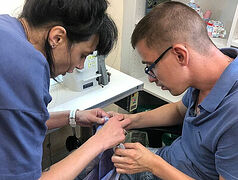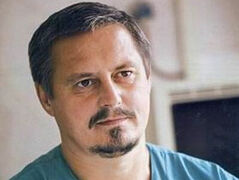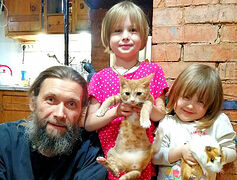Valentina Mikhailova is a mother of nine children: six of her own, three adopted, and four of them with Down’s syndrome. Such arithmetic of a large family is based on the axiom: when you accept this life and all the tinsel falls away, you begin to live and notice the breath of the Lord in everything again.”
—Valentina, how did your family begin?
—My husband and I first met in 1991, having entered the same university (Moscow Technical University of Communications and Informatics, the Department of Television and Radio Broadcasting). We did lab work together and started getting to know each other better. We got married in our fourth year, and I defended my thesis in the fourth month of pregnancy, when I was expecting Nastya [a diminutive form of the name Anastasia.—Trans.]. And I never worked in the field I was qualified for.
—Are you and your husband from large families?
—No, from ordinary Soviet families: I was the only child in the family, and my husband has a sister. My idea of large families was formed from observations... And as a rule, such families were alcoholics, “asocial elements”, as we called them. Their children grew up unwashed and hungry... In my childhood there was a stigma: if you have many children, they are “beggars” and “trash”. I did not have a single positive example.
—What was your attitude towards religion?
—We had none. We knew nothing about the Church. Moreover, in the 1990s various sects were active in the country, so there was a general fear of getting into the wrong place.
—Were there such temptations?
—It happened in our family. A relative of mine joined a sect in the 1990s. He was a forty-year-old military man and had a family... Now I imagine what he was going through: “The country is disintegrating, all the foundations and all my ideals have simply been destroyed; then what do I live for?” Nature abhors a vacuum so some “kind people” found him and said: “We’ll tell you the truth.” In 1992, he simply left the family (fortunately he did not sell the apartment, as is often the case) and disappeared for good.
As for faith, all began with my eldest daughter, Nastya. She was a very intelligent child and asked us a lot of questions. One day we saw a car hit a cat. My daughter asked me, “What’s next?” I said, “Well, they’ll pick it up now, bury it, and that’s it.”
Nastya was not satisfied with my answer at all. She asked again, “What’s next?” I could not answer this question, because I myself had never thought about what was next.
We would dye eggs for Pascha as a “ritual” at most and go to the cemetery like everyone else. A typical, ordinary, average family—that was us.
Nastya understood that I could not answer her anything about what was next... We then lived in the Tsaritsyno district in the south of Moscow. There was a library at the church [the Church of the Life-Giving Spring Icon of the Mother of God.—Trans.] there; so I subscribed to it responsibly in order to take a children’s book to tell my daughter a fairy tale.
I opened books for children aged three to 3.5 years old and got carried away: it turned out that I hadn’t known anything at all! We began to study together, first a Gospel for children in pictures, then from the age of four I enrolled her in Sunday school. Everything was arranged wisely there: while children were in the classroom, their parents went to talk to the priest. We had wonderful priests and the rector, Archpriest George Breyev of blessed memory. It was impossible to remain indifferent there, and I got immersed in that.
Then, thanks to our eldest daughter, the path of the formation of an Orthodox family and our integration into Church life began.
There is an absolute trust during the convert period, when you fly on your wings, have no questions and understand that this is exactly how it should be. And we wanted more children.
—How did your husband take your integration into Church life?
—Our relations are based on mutual trust. He first began to go with me and upon closer look agreed that it was cool.
 —How did your children “come” to you?
—How did your children “come” to you?
—Miraculously. I have an Rh incompatibility and can’t have children. That is, each subsequent pregnancy was a threat to the baby and a risk of possible bad consequences. But our trust was so great... I don’t even know how to describe it: every three years we started having babies despite my diagnosis. The doctors were horrified each time I came to the planning center pregnant again. But the Lord is merciful: all of my six children arrived safely.
They say: “If the Lord gives you children, you must accept them.” And we decided to have them all.
—But it must have been hard to raise so many children in the 1990s and the 2000s?
—Sometimes it seemed that it was the end, the last penny, that I wouldn’t buy anything else for the children and would only cook buckwheat porridge. But suddenly someone would come to visit us with a bag of presents, or my husband would find additional income somewhere or get a bonus. We just noticed it, those small miracles: there was trust that the Lord would not abandon us, that we would not remain hungry, that we would have everything we needed.
And then we entered a completely different world—a world of large families—exchanging things, mutual help and advice... My closest friends also have large families—one has seven children, another has four. Our parents did not immediately approve of our desire to have many children. While expecting the next baby, I could not tell my mother or mother-in-law that I was pregnant again, because they would start reproaching me: “What are you doing?! They’ll live in poverty!”
At that time there were no benefits for large families. Now people can say that parents decide to have many children for maternity benefits, but then there wasn’t such a thing.
—How has the attitude towards large families changed in society?
—First of all, there are ever more large families. I think today three children is practically the norm of life. I know quite a few families with three children.
Modern families are more active—they do not stay at home, and they talk about their lives. If we keep to ourselves, no one will know about us and we will not exist for others. We went “into the world” and showed that our children exist. They attended music school, art school, and sports sections. All of my children are always tidy, successful and well educated—cinema, theater, performances, travelling... We create this image with our open life, showing that a large family is a real value.
Since we had embarked on our journey of Orthodoxy, we understood that it was our true life. I think with horror, “What if the Lord had not touched us and had not knocked, we would not have found Him? What a nightmare! How would we have lived?” Such thoughts terrify me.
Our children began to go to the Orthodox school near our home in Tsaritsyno. And Anastasia, our eldest daughter, brought us to Sretensky Monastery. We moved as we needed to expand our living space, and it became hard to travel to Tsaritsyno with small children. It also became hard to attend services, and Nastya had just reached her teens—a nasty period when a child denies everything. But we have trust in the family, and there are no secrets. When she told me at the age of thirteen or fourteen, “I won’t go to church anymore—I don’t need it”, I asked her, “Nastya, you know how hard it is for me to go to church with the youngest children on Sundays. Just come and help me bring them to the chalice. It’s not you who’ll come—it’s your right. I just ask you to help me bring them to the chalice.” “Yes, mother, of course,” my daughter replied. And she remained in the Church all the same, although she did not seem to want to. She studied at music school and loved chants. Once she visited Sretensky Monastery, and its choir just astounded her! Nastya began to travel there on her own. There were seminarians, young guys, and a wonderful youth group there. She saw an informal approach and began to feel at home there. And we also began to go to the monastery.
We have attended services here for fifteen years now. Anastasia began to study the Church typikon and the beauty of worship, and as a result now she is the choir-director at the church of Moscow State University.
—Tell us a little about each of your children and their paths in life. Is Nastya already an adult?
—Yes, she is twenty-six. She is married, but has no children yet. She is no longer Nastya, but Anastasia Mikhailova, who has done a lot for the youth movement under the Patriarchate. Stepan is also a wonderful man; now he has a wife and two children. He graduated from an institute, is an engineer and works in his field. He sings very well; he sang in church… My daughter-in-law comes from a priest’s family.
Anfisa is three years younger than him. She is a little different and not so open. A very creative person, she lives on her own wavelength. She draws well and enjoys photography. She is a psychology student and is looking for herself.
Olga is my first mate. It seems she loves me the most and understands me the most, helping me with the younger girls. She is an athlete; she is keen on rowing and a very disciplined girl. Now, early in the morning, although it is raining, she has already dressed and gone for training. Olga is a very deep person: the church means a lot to her and she tries not to miss services. Our son Nikolai is next in age. He attends the Sunday school at Sretensky Monastery; he is fond of journalism and the Russian language.
—Nastya, Stepan, Anfisa, Olga, Nikolai...
—And the sixth child in our family changed us all dramatically. Angelina was born with Down’s syndrome. It’s like a powerful explosion—the birth of a special child. I had never met such people before. It was scary, incomprehensible, it seemed that my life was over, and, of course, I grumbled against God: “I’m so good, so positive, I so trusted You, but You gave me a ‘worthless’ child!”
Frankly, we were really distraught. Angelina was born in 2012, when there was still little information about such children. I had not seen one before, so it was very frightening.
Today, children with autism, CP and Down’s syndrome are more often taken home by their parents, and fewer of them are left in orphanages. Parents are no longer ashamed of them.
—What helped you regain your trust in God and in the world in general?
—This is probably the power of the family and the shoulder of my husband, who took everything into his hands, saying, “Stop, let’s collect ourselves, start anew, try to learn how to live in this situation. Maybe everything is not so scary—we don’t know anything about it yet.” My older children went online and found out where to go for rehabilitation and found the Downside Up charity foundation. Gradually I began to accept the situation—it took me about a year to get used it.
—Did you know before Angelina’s birth that she had Down’s syndrome?
—I didn’t. But anyway, I wouldn’t have had an abortion! Although you may say humbly, “Lord, I accept everything that You give me.” But when it came down to it, it was impossible to humbly accept everything. Here is the moment of truth, when you show who and what you are. Indeed, our family, our relationship went through a test, because so many families break up after the birth of a special child.
—What does Angelina do?
—Angelina is ten; she goes to a correctional school and has a lot of friends. She is wonderful, and most importantly, she destroyed this “top of the class complex” in me. She showed me that in general we are all free. All of our older children lived according to the same scheme: a good education, an excellent university, and so on. And with Angelina this will not happen, which means that you can be broader, you should not be hung up about things, but just live, enjoy life and notice positive moments. Of course, these children develop much more slowly than normal children do.
When Angelinochka was three, and there would be no more children after her, an idea occurred to me: Why not adopt someone? Namely, another child with Down’s syndrome, because they need love the most. Like flowers, they simply droop without love, care, affection, and warmth.
So we adopted Liza. Six months later, we realized that we had resources for another baby, and we adopted Vika with Down’s syndrome. Six months later Yasenka with the same disability appeared in our family.
Liza was an absolute angel. Once a young lady from the Orthodox youth group came to us as a nanny to sit with Liza for a couple of hours. A year ago she wrote to me on social media: “I couldn’t get pregnant for a long time, and then I had a baby with Down’s syndrome. But I wasn’t afraid at all, because I had the experience of communicating with Liza for those two hours.”
When I accepted the situation, when the anguish eased off, and it was no longer a “tragedy”, or “the Lord has punished us”—all the tinsel fell away, and I again began to live and notice the breath of the Lord in everything. Now we are happy: We have six children of our own and three adopted children—nine in total.
—You probably won’t stop there, will you?
—When we had only two adopted children, there were documents on hand for the possibility of adopting another such child. From the director of the Downside Up Foundation I learned that there was a mother who had given birth to such a girl and was not ready to leave her, but wanted to have her placed in good hands, roughly speaking, like a puppy.
I invited the woman with the baby to my place. I calmed her down, showed her how we lived, immersing her in ordinary motherhood. As a result, she decided not to give her daughter to anyone. Now we periodically call each other—her girl is eight years old.
—What would you say to families with a special child?
—First, if you are expecting such a baby, this diagnosis may not be confirmed. It is very sad if you sob and despair for nine months and then give birth to a healthy baby. All those emotions were useless, and it was bad for the little one.
But secondly, if such a baby has already been born, I really like the phrase: “You are not alone—there are families that have gone through this.” You need to learn more about this, learn from experience, use the information that is now widely accessible; know that everything is possible when you love, when you are surrounded by people.
—Is there any universal advice for all mothers?
—For me the most important thing is Attitude, with a capital A. We need to think more broadly. Trust and love are the basic principles of our family. They allowed us to become a real family. Even when I don’t feel like doing something, when I’m lazy, I ask, and they help me. If the mother asks, you the child has to do it.






